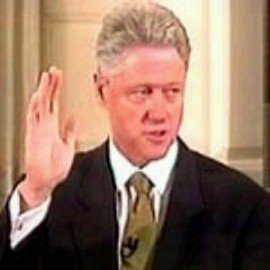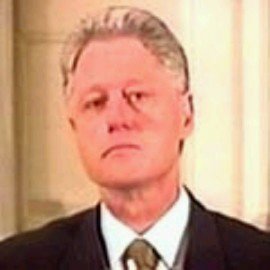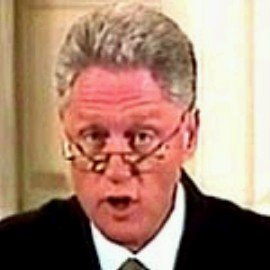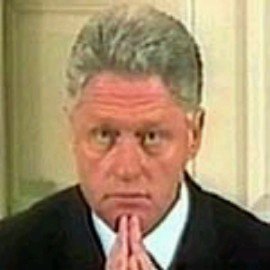
President Clinton is sworn in for his videotaped grand jury testimony Monday, Aug. 17, 1998.

Clinton begins his videotaped grand jury testimony Monday, Aug. 17, 1998.

Clinton makes an opening statement in his videotaped grand jury testimony.

Clinton responds to a question about his interpretation of sexual relations.
Do you think the Lewinsky matter would have played out any differently?
Would Fitzgerald have indicted Bill Clinton?
Based on the indictment of Scooter Libby, one can only conclude that Fitzgerald most definitely would have indicted Clinton on obstruction of justice, false statement and perjury charges.
Consider what Clinton did, from the Starr Report:
1. President Clinton lied under oath in his civil case when he denied a sexual affair, a sexual relationship, or sexual relations with Monica Lewinsky.
2. President Clinton lied under oath to the grand jury about his sexual relationship with Ms. Lewinsky.
3. In his civil deposition, to support his false statement about the sexual relationship, President Clinton also lied under oath about being alone with Ms. Lewinsky and about the many gifts exchanged between Ms. Lewinsky and him.
4. President Clinton lied under oath in his civil deposition about his discussions with Ms. Lewinsky concerning her involvement in the Jones case.
5. During the Jones case, the President obstructed justice and had an understanding with Ms. Lewinsky to jointly conceal the truth about their relationship by concealing gifts subpoenaed by Ms. Jones's attorneys.
6. During the Jones case, the President obstructed justice and had an understanding with Ms. Lewinsky to jointly conceal the truth of their relationship from the judicial process by a scheme that included the following means: (i) Both the President and Ms. Lewinsky understood that they would lie under oath in the Jones case about their sexual relationship; (ii) the President suggested to Ms. Lewinsky that she prepare an affidavit that, for the President's purposes, would memorialize her testimony under oath and could be used to prevent questioning of both of them about their relationship; (iii) Ms. Lewinsky signed and filed the false affidavit; (iv) the President used Ms. Lewinsky's false affidavit at his deposition in an attempt to head off questions about Ms. Lewinsky; and (v) when that failed, the President lied under oath at his civil deposition about the relationship with Ms. Lewinsky.
7. President Clinton endeavored to obstruct justice by helping Ms. Lewinsky obtain a job in New York at a time when she would have been a witness harmful to him were she to tell the truth in the Jones case.
8. President Clinton lied under oath in his civil deposition about his discussions with Vernon Jordan concerning Ms. Lewinsky's involvement in the Jones case.
9. The President improperly tampered with a potential witness by attempting to corruptly influence the testimony of his personal secretary, Betty Currie, in the days after his civil deposition.
10. President Clinton endeavored to obstruct justice during the grand jury investigation by refusing to testify for seven months and lying to senior White House aides with knowledge that they would relay the President's false statements to the grand jury -- and did thereby deceive, obstruct, and impede the grand jury.
11. President Clinton abused his constitutional authority by (i) lying to the public and the Congress in January 1998 about his relationship with Ms. Lewinsky; (ii) promising at that time to cooperate fully with the grand jury investigation; (iii) later refusing six invitations to testify voluntarily to the grand jury; (iv) invoking Executive Privilege; (v) lying to the grand jury in August 1998; and (vi) lying again to the public and Congress on August 17, 1998 -- all as part of an effort to hinder, impede, and deflect possible inquiry by the Congress of the United States.
Obviously, Starr concluded that Clinton lied, a lot.
Nonetheless, Starr was satisfied with the deal that Clinton cut with Robert Ray to avoid being prosecuted in court.
Newsmax, January 23, 2001:
In a CNN interview, the former independent counsel said:
The last-minute "accommodation" Clinton reached with Starr's successor, Robert Ray, was "a very reasonable and sensible solution" in which the departing president "did acknowledge his responsibility and his shortcoming as a witness in the system.
...Starr called Clinton's deal last week a fitting end to an "unfortunate era."
In his final full day in office, Clinton wriggled out of any possible indictment in the Monica Lewinsky case by acknowledging for the first time that he had made false statements under oath about his relationship with the former White House intern.
And to wipe out the disbarment proceedings against him in his home state of Arkansas, Clinton agreed to let his law license be suspended for five years and to pay a $25,000 fine.
Starr said Clinton could have ended his predicament years ago by admitting his wrongdoing.
"It obviously would have been far better, less expensive, less divisive, if this acknowledgment would have come much earlier – say, in January of 1998," Starr said.
"But better late than never, and that's what I think helps bring, properly and reasonably, closure."
Considering how aggressively Fitzgerald went after Scooter Libby, I seriously doubt that he would have let Clinton get off without an indictment.
I guess the Dems should be thankful that Patrick Fitzgerald wasn't at the helm of the investigations into Clinton's many offenses.
I can't imagine Fitzgerald the Zealous giving Clinton a pass.
No comments:
Post a Comment